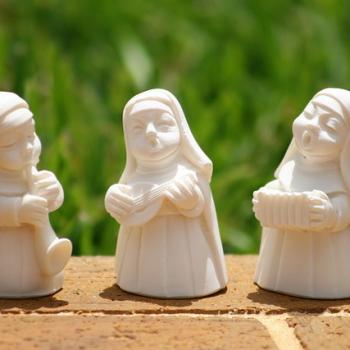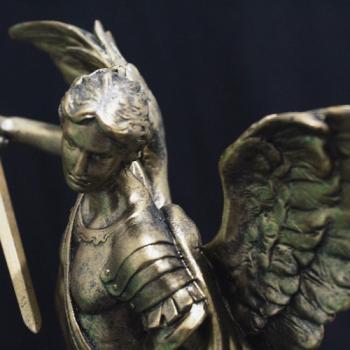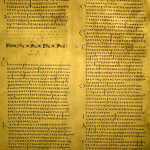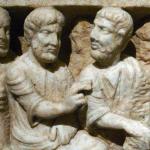
It was after dark when I realized we were out of milk.
I was having a bit of my bad anxiety and didn’t want to go to the store again. But I’m the family’s only driver, so Michael said he’d go in to buy it for me if I dropped him off and waited. Adrienne is old enough to stay at home for a short time now, and I no longer fear our stalker if I choose to do that, so it turned into a date.
I took a few wrong turns on purpose, ten minutes instead of five, to enjoy the Christmas lights and the quiet.
We drove past the water treatment facility by the park. They had two great big triangles made of Christmas lights on the front lawn: one was a tree. The other was a rather impressive representation of the Veterans’ Memorial Bridge with its suspender cables folding out on either side. That’s the bridge my friend used to call “The Mercy Bridge” because it reminded her of the rays coming from the Heart of Jesus in the Divine Mercy image.
I mentioned to Michael that I call that bridge the Brig O Dread.
Michael couldn’t place the name, so I explained about the mythical bridge to purgatory, where the damned souls would slip off and fall into hell. That reminded me of my disastrous attempt at a relaxing day in Pittsburgh, and I told him about reciting the Lyke Wake Dirge to myself to keep from having a panic attack on the Fort Pitt Bridge at Rush Hour. I described, as much as I could remember, the winny-muir and the brig O dread and finding the shoes and the food and drink you gave away in this life there to help you in the afterlife. Michael said it reminded him of the ancient Egyptian Book of the Dead, which neither of us has studied at any depth. I went through an Ancient Egypt phase in elementary school, though, and I remembered reading that you could get through the Egyptian underworld to a pleasant afterlife by memorizing phrases to say at certain points in your journey, rather than by actually having lived well.
I always wondered what that looked like in practice. Religions look very different when you only read the official texts. If you talk to a person who belongs to a religion, they could start telling you how those words are enacted or ignored in real life, in a certain culture and time. They would show you, perhaps without meaning to, all the notions they’ve internalized about their religion that another practitioner in the same faith at another place and time wouldn’t recognize. Just think of my satire of Catholic Traditionalists. I wondered what a specific person living in Thebes in a specific dynasty thought about the afterlife and what it took to have a good one.
That brought us to a conversation about ancient Roman mystery cults, which also taught you could get through the afterlife safely by memorizing the right things to say.
“I’m probably going to get in trouble for saying this,” I ventured, as if a saint or angel would appear in the car and smack me. “But it reminds me of the way some people in my family talked about prayer.”
And it does– not because my family is uniquely superstitious. They’re not. But because of the culture we belonged to, prayer tended to be imagined as a kind of magic, where you could make things happen by saying the right words or holding the right talisman. Keep a copy of this miraculous image in your home and you won’t fall into mortal sin. Pray the Rosary daily and the Virgin Mary will protect you from theological errors. Pray to Saint such-and-such and she will manipulate your children into going to Heaven. Recite this series of devotions every day for three years and you will become a saint, and three generations of your family will join you in paradise.
It’s not that the people I grew up with didn’t also try to do good things for one another and try to keep free from sin. We did. And it’s not that we didn’t pray for other, better reasons; we certainly did. But always also that background notion, absorbed from our culture, that there were cheat codes.
I remembered the time that Adrienne and I got a ride to Mass on All Souls’ Day from a nice old lady in town, who stopped in a graveyard in twilight on the way back. She prayed an Our Father, a Hail Mary and a Doxology before explaining to Adrienne: “every time you say that in a graveyard, a soul flies out of purgatory!”
It all seems so hollow to me now. All these different ways to trick God into letting you or somebody else into Heaven instead of becoming someone who does the things of Heaven. All of those words to appease someone you claim to believe is Mercy Himself.
Right now, after all the horrifying events of the past few years, I am so burnt out on liturgy and ritual and words that it’s hard to find anything good in them. I don’t think they are actually all bad. I think prayer and ritual are very good. But I have seen so much of the cynical, magical thinking form of ritual that it’s hard to remember it’s good.
I wondered, driving around Steubenville at night in a bad anxious state at the darkest time of year, if this was a pattern in every religion there had ever been: setting up rules of how to live, and having them reduced to a formula for recitation. The people realizing that God wants them to act in a certain way, and then trying to find a shortcut when they don’t. God informing the people that whatsoever they do to the least of His brethren, they do to Him, and meaning it, and people trying to trick God into thinking they’ve treated Him well. Again and again and again.
I wonder what that means for me, in this terrible deconstruction.
And then I really did feel dread.
And then we were at the grocery store in a boring shopping center in a nasty town in Northern Appalachia, and everything was ordinary once again.
image via Pixabay
Mary Pezzulo is the author of Meditations on the Way of the Cross, The Sorrows and Joys of Mary, and Stumbling into Grace: How We Meet God in Tiny Works of Mercy.

















